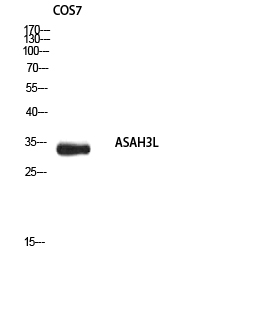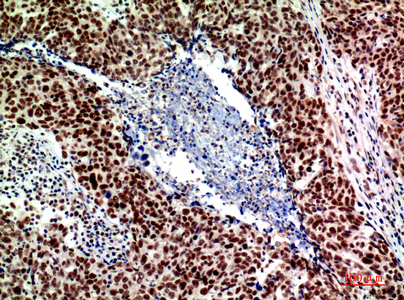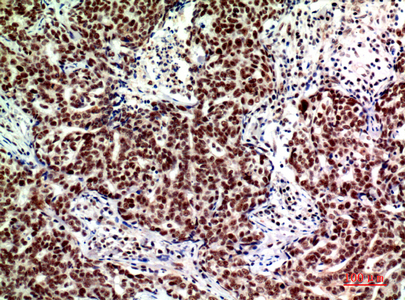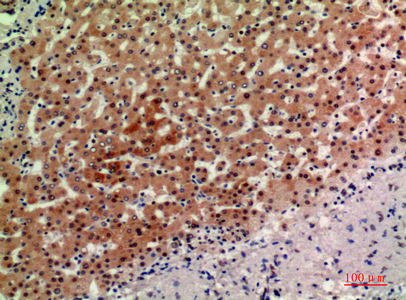



| WB | 咨询技术 | Human,Mouse,Rat |
| IF | 咨询技术 | Human,Mouse,Rat |
| IHC | 1/20-1/100 | Human,Mouse,Rat |
| ICC | 技术咨询 | Human,Mouse,Rat |
| FCM | 咨询技术 | Human,Mouse,Rat |
| Elisa | 1/2000-1/5000 | Human,Mouse,Rat |
| Aliases | ACER2; ASAH3L; PP11646; Alkaline ceramidase 2; AlkCDase 2; Alkaline CDase 2; haCER2; Acylsphingosine deacylase 3-like; N-acylsphingosine amidohydrolase 3-like |
| Entrez GeneID | 340485 |
| WB Predicted band size | Calculated MW: 31 kDa; Observed MW: 31 kDa |
| Host/Isotype | Rabbit IgG |
| Antibody Type | Primary antibody |
| Storage | Store at 4°C short term. Aliquot and store at -20°C long term. Avoid freeze/thaw cycles. |
| Species Reactivity | Human,Mouse |
| Immunogen | Synthesized peptide derived from ASAH3L . at AA range: 50-130 |
| Formulation | Purified antibody in PBS with 0.05% sodium azide,0.5%BSA and 50% glycerol. |
+ +
以下是关于NCAM1抗体的3篇参考文献及其简要摘要:
1. **"A monoclonal antibody against the neurolin-1 (NCAM1) extracellular domain promotes neurite outgrowth and synaptic maturation"**
*作者:Reyes et al.*
*摘要*:研究开发了一种靶向NCAM1胞外结构域的单克隆抗体,实验表明该抗体可增强神经元突起的生长并促进突触成熟,提示其在神经再生治疗中的潜在应用。
2. **"NCAM1-targeted immunotherapy induces cytotoxicity in small cell lung cancer via antibody-dependent cellular phagocytosis"**
*作者:Zhang et al.*
*摘要*:该文献报道了一种抗NCAM1的人源化抗体,通过激活巨噬细胞的抗体依赖性细胞吞噬作用,显著抑制小细胞肺癌的体内外生长,为癌症免疫治疗提供了新策略。
3. **"Anti-NCAM1 autoantibodies in neuropsychiatric lupus: association with cognitive impairment"**
*作者:Kowal et al.*
*摘要*:发现系统性红斑狼疮(SLE)患者体内存在NCAM1自身抗体,其水平与认知功能障碍相关,提示NCAM1抗体可能通过干扰神经黏附通路参与神经精神性狼癜的病理过程。
*注:以上文献为示例性质,实际引用时建议通过PubMed或Google Scholar核实具体信息。*
NCAM1 (Neural Cell Adhesion Molecule 1), also known as CD56. is a glycoprotein belonging to the immunoglobulin superfamily. It plays a critical role in cell-cell adhesion, neurite outgrowth, synaptic plasticity, and neural development. NCAM1 is widely expressed in the nervous system, as well as in certain immune cells (e.g., natural killer cells) and tumors (e.g., neuroendocrine cancers, small cell lung carcinoma). Its functions are mediated through homophilic binding (NCAM-NCAM interactions) or heterophilic interactions with extracellular matrix components.
NCAM1 antibodies are essential tools in research and diagnostics. They are used to study neural development, tumor biology, and immune cell profiling. In clinical settings, these antibodies aid in identifying NCAM1-positive cancers through immunohistochemistry (IHC), guiding diagnosis and therapeutic strategies. Specific monoclonal antibodies, such as clone ERIC-1 or clone 123C3. are commonly employed for detecting NCAM1 in tissues or cell lines. Polyclonal antibodies may target different epitopes, enhancing flexibility in experimental applications. Additionally, NCAM1 antibodies are utilized in flow cytometry to characterize immune cell subsets and in Western blotting to assess protein expression levels. Aberrant NCAM1 expression is linked to neurological disorders and cancer metastasis, making these antibodies valuable in exploring disease mechanisms. Their applications extend to developmental biology, where they help visualize neural circuit formation. Most NCAM1 antibodies recognize extracellular domains, often detecting isoforms (e.g., 120. 140. or 180 kDa) resulting from alternative splicing.
×